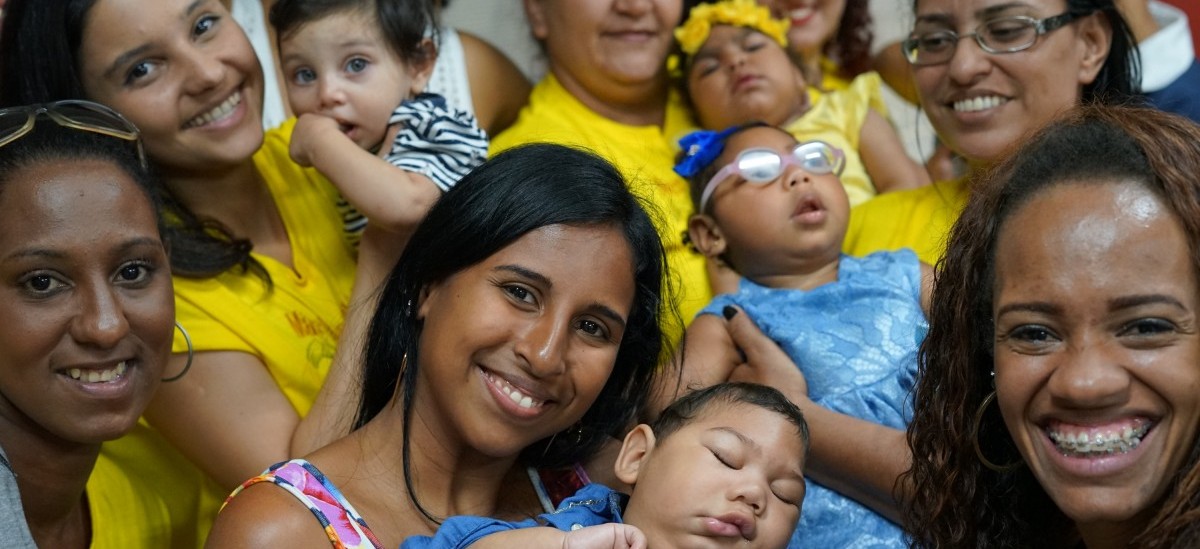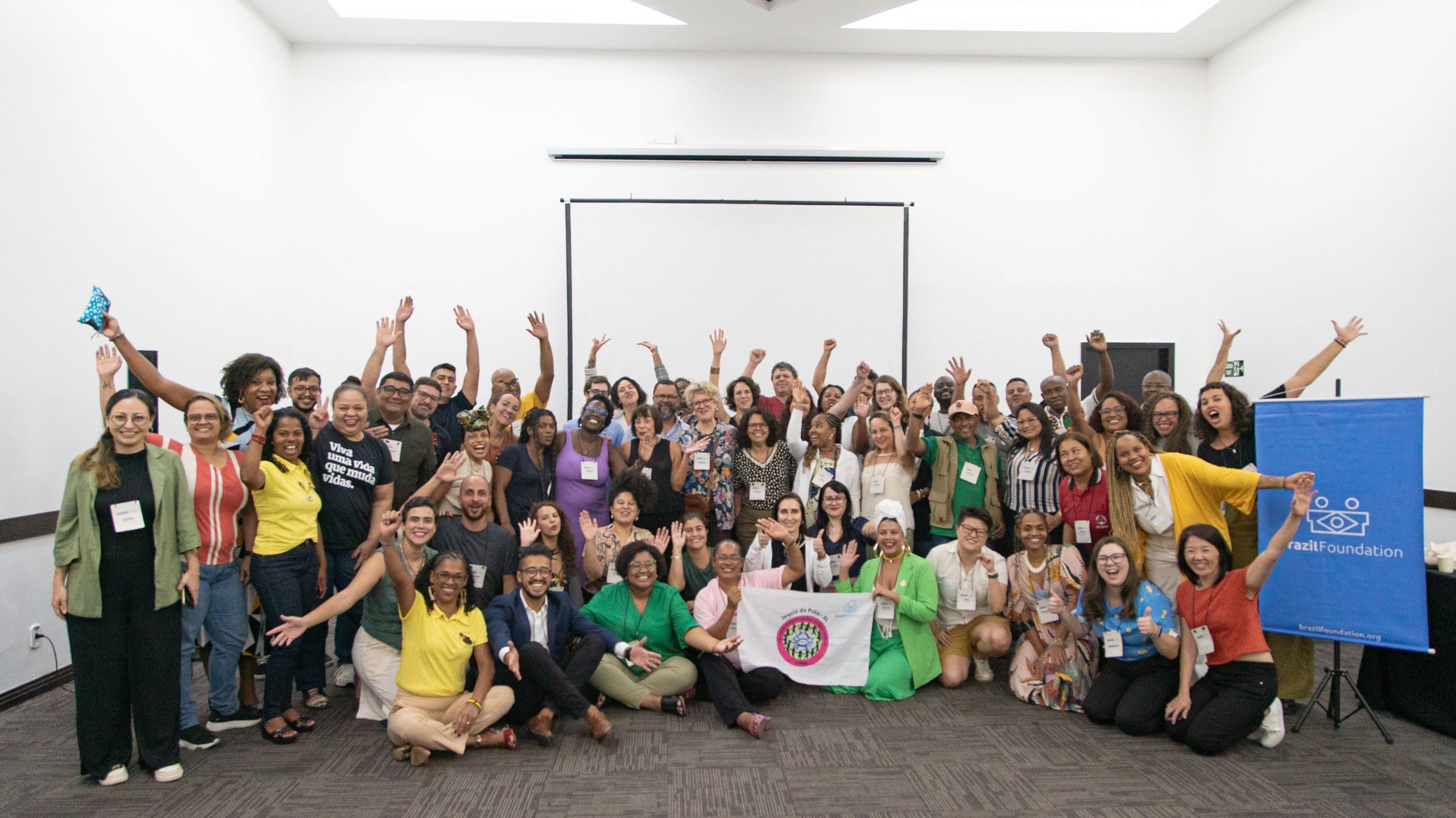Celebrating Mothers
With opportunity and support, mothers not only help themselves, but also her children and family. By investing in initiatives that promote health, human rights, education, professional opportunities for mothers, we can impact entire communities. This Mother’s Day, we’d like to share with you some inspiring grantee partners that work directly or indirectly with mothers in Brazil.
Saúde Criança Responder
Rio de Janeiro, RJ
Saúde Criança Responder provides comprehensive services in health, education, professional training, housing, and civic engagement to help change the realities of families who have children with chronic illnesses in Rio de Janeiro. As the institution believes that access to information and opportunities are the gateway to transformation, they offer mothers classes that can prepare them to earn income as artisans, cooks and vendors, and support their families.
“We saw that one of the biggest transformations happens when you feel part of a group, stronger together”, Cida Paranho, Coordinator at Saúde Criança Responder
Arlette arrived in Brazil in 2011 as a refugee from Congo, and came to Saúde Criança when one of her children became sick. She and her family faced financial instability during this time, which was exacerbated by language barriers, until she began attending Saúde Criança’s meetings and their professional training courses. She started to believe in herself and the possibility for a better future, and began working informally. Now, earning a greater income, she can provide more for her family. Her kids are all in school and her husband dreams of pursuing studies.
[envira-gallery id=”23058″]
Anis – Instituto de Bioética
Brasília, DF
Anis empowers communities, mothers and caretakers of children affected by the Zika epidemic in vulnerable regions in Brazil. They offer legal support and counseling on living with disabilities, rights and sexual and reproductive health so that affected children can receive the care they need while ensuring their rights are respected. Their work depends on collaboration on a greater scale with healthcare professionals, social workers, public defenders, administrators and municipal legislators.
With the Zika public health emergency now over, the epidemic is now out of the spotlight. This, however, is causing concern. “There is still much to be done, as the women and children affected by Zika have been forgotten in the public debate.” Luciana Brito, Anis Team
[envira-gallery id=”23055″]
Abraço a Microcefalia
Salvador, BA
Abraço a Microcefalia also works with children and families affected by the Zika virus in Brazil, promoting the inclusion of these children and providing them a network of support in various ways. The organization provides children individualized occupational therapy, physical therapy, nutrition counseling, and any new innovative treatment that they may encounter. In 2017 they launched a children’s book whose protagonist is a child with congenital Zika syndrome.
How does Abraço work specifically with mothers?
The support doesn’t stop at the children – it is also extended to the mothers, often single parents, who experience great challenges in caring for their child. Along with providing important information on how to properly care for their children, Abraço holds bi-weekly meetings for the mothers where they can relax, let loose and build strong friendships.
“Improving a mother’s well-being directly affects the development of the child; we believe that affection is the means for a person’s development.” – Joana Passos, Abraço Microcefalia team
[envira-gallery id=”23040″]
Mãe&Mais
Rio de Janeiro, RJ
Mães&Mais promotes health education and provides services in gynecology, pediatrics, physical therapy, nutrition and counseling to mothers and young children in Rio de Janeiro. Their work has impacted 630 mothers and 408 children to date. Their dream is to someday open the first multidisciplinary accessible community clinic for mothers and children ages 0 to 6 in a low-income neighborhood. They also aim to scale their work to reach 10,000 mothers and children.
Long-term impact
“My name is Gisele, I’m 38 and I have 3 kids who are 14, 6, and 1 years old. Mãe&Mais came into my life during a difficult time for me. I was unemployed, pregnant with my third child, 36 years old, and thinking that this was the end. Their services helped me see the potential in maternity and that [as a mother] I can live more freely and with dignity. Today I feel like a mom and much more!”
[envira-gallery id="23056"]
Pontes de Amor
Uberlândia, MG
Pontes de Amor provides family support for children in fostercare or who are undergoing the adoption process. The organization was founded as a response to the high return rates of children by adoptive families in Brazil, and the family crises seen in the post adoption stage due to lack of support and psychological monitoring for these families. Pontes de Amor helps promote healthy familial relationships and a more informed public on many aspects of adoption.
How does Pontes de Amor’s work affect mothers?
Their programs work with the family as a whole, including biological and adoptive mothers. They offer legal counseling for families and children and also services such as therapy and interventions to support and prepare families emotionally for their circumstances. In five years, Pontes de Amor has managed to reduce the post-adoption return rate of the children it monitors to zero, while registering an increase in the number of adoptions.
[envira-gallery id=”23060″]
ONG Amigos da Vida
Brasília, D.F.
Amigos da Vida provides legal assistance for people living with and children orphaned because of HIV/AIDS. They’ve also built 10 playrooms in hospitals in Brasília for children between the ages of 7 and 12 living with HIV/AIDS and or other diseases. They collaborate with educators, psychologists, social heir work aims to decrease hospitalization periods and increase life expectancy for these children by focusing on their emotional well-being and the mother-child relationship. Their goal for the future is to expand their model to all hospitals regarding pediatric HIV/AIDs treatment.
Mothers, children and families benefit from their support and counseling
Dona Iracema and her family received assistance from Amigos da Vida after her 7-old son, who had contracted HIV at birth, could no longer receive treatment. The family, who lives in Planaltina, received food donations and support to help build a body shop for Davi’s father, who was unemployed at the time and battling alcoholism. “Through the work of our volunteers we were able to change the reality of a family facing great difficulties, who at couldn’t even feed themselves properly.” – Christiano Ramos, Founder, Amigos da Vida
[envira-gallery id=”23059″]

